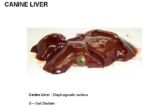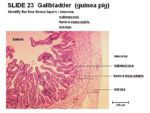Difference between revisions of "Gall Bladder - Anatomy & Physiology"
Jump to navigation
Jump to search
| Line 45: | Line 45: | ||
'''Equine''' | '''Equine''' | ||
*The horse has no gallbladder | *The horse has no gallbladder | ||
| + | |||
| + | '''Rodents''' | ||
| + | *Rats do not have a gallbladder | ||
'''Canine''' | '''Canine''' | ||
*In some dogs, the gallbladder is so deeply embedded it makes contact with the diaphragm and contacts the parietal surface | *In some dogs, the gallbladder is so deeply embedded it makes contact with the diaphragm and contacts the parietal surface | ||
| − | ''' | + | *Thinest layers of tunica muscularis |
| − | * | + | |
| + | '''Bovine''' | ||
| + | *Thickest layers of tunica muscularis | ||
| + | |||
Revision as of 15:20, 10 July 2008
Introduction
The gallbladder stores bile produced in the liver. Bile is important in the digestion of lipids.
Structure
- Lies between the right medial and quadrate lobes of the liver
- Partly attached
- Partly free
Function
- Stores bile
- Concentrates bile by absorption through the folded mucosal wall
Innervation
- Parasympathetic nerves
Histology
- Highly folded mucosa
- Reduced submucosa
- No lamina muscularis
- Simple columnar epithelium
- No glands
Species Differences
Equine
- The horse has no gallbladder
Rodents
- Rats do not have a gallbladder
Canine
- In some dogs, the gallbladder is so deeply embedded it makes contact with the diaphragm and contacts the parietal surface
- Thinest layers of tunica muscularis
Bovine
- Thickest layers of tunica muscularis

